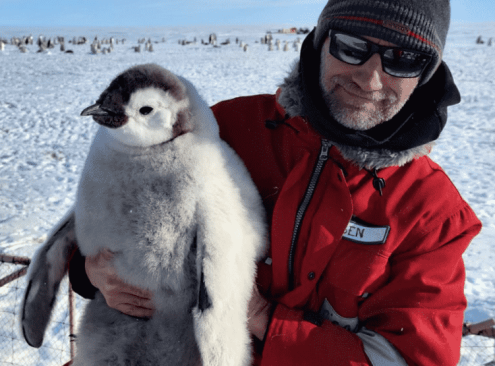© Pint of Science, 2024. All rights reserved.
Join us for the final day of our science event, where we explore rodent research and the physics of Emperor Penguins! Learn about the challenges and innovations in mouse models, then delve into the mysteries of penguin survival in Antarctica. Gain insights into the biology and physics of these remarkable creatures and expand your knowledge at the intersection of science!
Born to be Wild – Of Mice and Men and Wildlings
Stephan Rosshart
(Speaker)
Mouse models are essential for research but suffer from significant flaws, including irreproducible results due to differing microbiota among institutions and poor translation to human clinical practice. This raises the urgent question: How can we address these issues? Microbiome research offers insights. While genetics were once thought the primary barrier to translatability, recent work shows lab mice diverge too much from natural conditions to accurately mirror human physiology. To enhance mouse models, three concepts emerge: the "rewilding approach," exposing mice to diverse semi-natural environments; the "dirty mouse approach," introducing pathogens for natural exposure; and the "natural microbiota approach," implanting lab mouse embryos into wild mice to create "wildlings." Wildlings more closely resemble humans' natural microbial ecosystem while retaining lab mouse genetics. In preclinical trials, wildlings accurately mimic human responses, potentially averting catastrophic failures seen with traditional models. Their stable, resilient microbiomes offer promising opportunities to advance drug discovery, improve safety, reduce costs, and accelerate disease treatments for human health benefit.

© Public domain
Physics of Emperor Penguins
Ben Fabry
(Speaker)
Emperor Penguins are the only vertebrates that breed in Antarctica during the austral winter, where they endure temperatures below -45°C and winds up to 50m/s. Male penguins incubate the eggs and fast for about 110–120 days. To conserve energy, they aggregate in huddles so tightly packed that any internal rearrangement is impossible. This poses an interesting physical problem: how can penguins from the periphery reach the warmer center of the huddle? To answer this and related questions, since 2013 we have been running a remotely operated observatory at Atka Bay, Antarctica, home to one of the largest known emperor penguin colonies.

© Public domain
Map data © OpenStreetMap contributors.